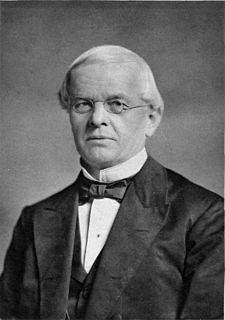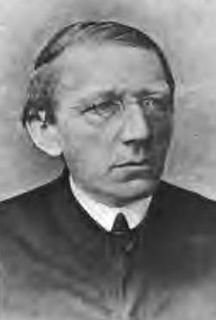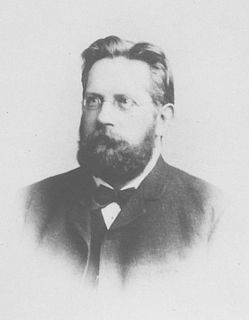
1763 (MDCCLXIII) was a common year starting on Saturday of the Gregorian calendar and a common year starting on Wednesday of the Julian calendar, the 1763rd year of the Common Era (CE) and Anno Domini (AD) designations, the 763rd year of the 2nd millennium, the 63rd year of the 18th century, and the 4th year of the 1760s decade. As of the start of 1763, the Gregorian calendar was 11 days ahead of the Julian calendar, which remained in localized use until 1923.

Georg Heinrich August Ewald was a German orientalist, Protestant theologian, and Biblical exegete. He studied at the University of Göttingen. In 1827 he became extraordinary professor there, in 1831 ordinary professor of theology, and in 1835 professor of oriental languages. In 1837, as a member of the Göttingen Seven, he lost his position at Göttingen on account of his protest against King Ernst August's abrogation of the liberal constitution, and became professor of theology at the University of Tübingen. In 1848, he returned to his old position at Göttingen. When Hanover was annexed by Prussia in 1866, Ewald became a defender of the rights of the ex-king. Among his chief works are: Complete Course on the Hebrew Language, The Poetical Books of the Old Testament, History of the People of Israel, and Antiquities of the People of Israel. Ewald represented the city of Hanover as a member of the Guelph faction in the North German and German Diets.

Christian Friedrich August Dillmann was a German orientalist and biblical scholar.

Franz Heinrich Reusch was an Old Catholic theologian.

Johann Georg Justus Perthes was a German publisher and founder of the publishing house that bears his name.

Gustav Benjamin Schwab was a German writer, pastor and publisher.

Heinrich August Winkler is a German historian.

Wilhelm Windelband was a German philosopher of the Baden School.

Heinrich Ernst Beyrich was a German palaeontologist.

August Friedrich von Pauly was a German educator and classical philologist.
Walter Ehrlich was a German philosopher.
John Meier was a German folklorist and philologist. He founded both The German Archive of Folk Song(Deutsches Volksliedarchiv, DVA) and also the Swiss Volksliedarchiv.

Heinrich Lambert Wilhelm Hauchecorne was a German geologist of French Huguenot parentage who was born in Aachen.
Ernst Christian Walz was a German classical philologist and archaeologist born in Münklingen, located in present-day Baden-Württemberg.

Franz Martin Hilgendorf was a German zoologist and paleontologist. Hilgendorf's research on fossil snails from the Steinheim crater in the early 1860s became a palaeontological evidence for the theory of evolution published by Charles Darwin in 1859.

Pirmin Adrian Meier is a Swiss author and teacher. To fellow writer Hansjörg Schneider, Meier is "der eigenständigste und eigenwilligste Schweizer Geschichtsschreiber seiner Generation".
Werner Spies is a German art historian, journalist and organizer of exhibitions. From 1997 to 2000, he was also a director of the Centre Georges Pompidou in Paris. According to Klaus Albrecht Schröder, director of the Albertina, Vienna, Spies is "one of the most influential art historians of the 20th century."

The Embassy of Austria in London is the diplomatic mission of Austria in the United Kingdom. Austria also maintain a Commercial Section at 45 Prince’s Gate, South Kensington and a Cultural Section at 28 Rutland Gate, South Kensington.

Ernst Hermann Himmler was a German Nazi functionary, engineer and younger brother of Reichsführer-SS Heinrich Himmler.



















